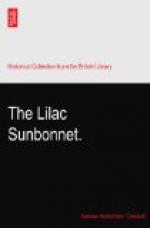“This is your study,” she said, standing back to let him look in. It was a long, low room with an outside stair above the farthermost barn, and Winsome had fitted it up wondrously for Ralph. It opened off the orchard, and the late blossoms scattered into it when the winds blew from the south.
They stood together on the topmost step. There was a desk and one chair, and a low window-seat in each of the deep windows.
“You will never be disturbed here,” said Winsome.
“But I want to be disturbed,” said Ralph, who was young and did not know any better.
“Now go in,” said Winsome, giving him a little push in the way that, without any offence, a proximate wife may. “Go in and study a little this morning, and see how you like it.”
Ralph considered this as fair provocation, and turned, with bonds and imprisonment in his mind. But Winsome had vanished.
But from beneath came a clear voice out of the unseen:
“If you don’t like it, you can come round and tell me. It will not be too late till the afternoon. Any time before three!”
A mere man is at a terrible disadvantage in word play of this kind. On this occasion Ralph could think of nothing better than—
“Winsome Charteris, I shall pay you back for this!”
Then he heard what might either have been a bell ringing for the fairies’ breakfast, or a ripple of the merriest earthly laughter very far away.
Then he sat down to study.
It took him quite an hour to arrive at a conclusion; but when reached it was a momentous one. It was, that it is a mistake to be married in summer, for three o’clock in the afternoon is such a long time in coming.
CHAPTER XLV.
The last of the lilac sunbonnet.
Craig Ronald lies bright in a dreaming day in mid-September. The reapers are once more in the fields. Far away there is a crying of voices. The corn-fields by the bridge are white with a bloomy and mellow whiteness. Some part of the oats is already down. Close into the standing crop there is a series of rhythmic flashes, the scythes swinging like a long wave that curls over here and there. Behind the line of flashing steel the harvesters swarm like ants running hither and thither crosswise, apparently in aimless fashion.
Up through the orchard comes a girl, tall and graceful, but with a touch of something nobler and stiller that does not come to girlhood. It is the seal of the diviner Eden grace which only comes with the after Eden pain.
Winsome Peden carries more than ever of the old grace and beauty; and the eyes of her husband, who has been finishing the proofs of his next volume and at intervals looking over the busy fields to the levels of Loch Grannoch, tell her so as she comes.
But suddenly from opposite sides of the orchard this girl with the gracious something in her eyes is borne down by simultaneous assault. Shrieking with delight, a boy and a girl, dressed in complete defensive armour of daisies, and wielding desperate arms of lath manufactured by Andra Kissock, their slave, rush fiercely upon her. They pull down their quarry after a brisk chase, who sinks helplessly upon the grass under a merciless fire of caresses.




